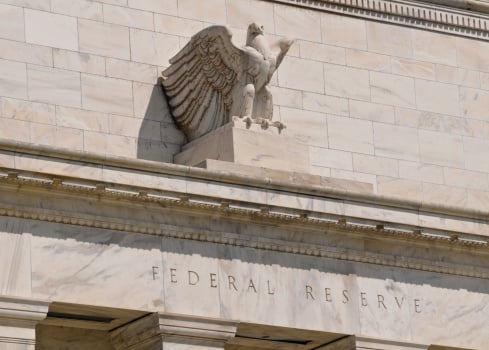Federal Reserve Stays Dovish in Last FOMC Meeting Ahead of 2015
December 17, 2014 by Jon C. Ogg
The December meeting was a vote of 7-3 for the Fed Funds action. Most Fed members still see the first rate hikes taking place in 2015. That was 15 of the 17 members, with two members seeing rate hikes starting in 2016. The Fed’s language changed a bit, but the reference “considerable” was maintained.
24/7 Wall St. has included the key comments in the statement, as well as listing the new multiyear economic forecasts by the Fed for gross domestic product (GDP), inflation, unemployment, and Fed Funds. The Fed’s key statement points said:
Based on its current assessment, the Committee judges that it can be patient in beginning to normalize the stance of monetary policy. The Committee sees this guidance as consistent with its previous statement that it likely will be appropriate to maintain the 0 to 1/4 percent target range for the federal funds rate for a considerable time following the end of its asset purchase program in October, especially if projected inflation continues to run below the Committee’s 2 percent longer-run goal, and provided that longer-term inflation expectations remain well anchored.
The Committee is maintaining its existing policy of reinvesting principal payments from its holdings of agency debt and agency mortgage-backed securities in agency mortgage-backed securities and of rolling over maturing Treasury securities at auction.
When the Committee decides to begin to remove policy accommodation, it will take a balanced approach consistent with its longer-run goals of maximum employment and inflation of 2 percent. The Committee currently anticipates that, even after employment and inflation are near mandate-consistent levels, economic conditions may, for some time, warrant keeping the target federal funds rate below levels the Committee views as normal in the longer run.
The three dissenting votes were as follows:
- Fisher from Dallas, supporting rate hikes sooner than others
- Philly Fed’s Plosser, objecting to the passage of time as an element in forward guidance
- Minneapolis Fed’s Kocherlakota, citing a downside risk to the credibility of the Fed’s 2% inflation target
ALSO READ: 10 Dying and 10 Thriving U.S. Industries
The most recent inflation data have posed a troublesome task for the Federal Reserve. How do you raise interest rates when you are on the verge of not just sub-standard but deflationary? Still, here are the median outlooks for Fed Funds over the coming years:
- 1.125% at end of 2015
- 2.500% at end of 2016
- 3.625% at end of 2017
- 3.75% in the longer run
GDP prospects for the years ahead were projected as follows:
- 2.3% to 2.4% in 2014
- 2.6% to 3.0% in 2015
- 2.5% to 3.0% in 2016
- 2.3% to 2.5% in 2017
Inflation targets were listed as the following for the years ahead:
- 1.2% to 1.3% in 2014
- 1.0% to 1.6% in 2015
- 1.7% to 2.0% in 2016
- 1.8% to 2.0% 2017
Unemployment was projected to have the following targets for the years ahead:
- 5.8% in late 2014
- 5.2% to 5.3% by late 2015
- 5.0% to 5.2% by late 2016
- 4.9% to 5.3% by late 2017
ALSO READ: How Oil Is Being Hurt by US, and Why It Goes Back Up in 2015
Essential Tips for Investing: Sponsored
A financial advisor can help you understand the advantages and disadvantages of investment properties. Finding a qualified financial advisor doesn’t have to be hard. SmartAsset’s free tool matches you with up to three financial advisors who serve your area, and you can interview your advisor matches at no cost to decide which one is right for you. If you’re ready to find an advisor who can help you achieve your financial goals, get started now.
Investing in real estate can diversify your portfolio. But expanding your horizons may add additional costs. If you’re an investor looking to minimize expenses, consider checking out online brokerages. They often offer low investment fees, helping you maximize your profit.